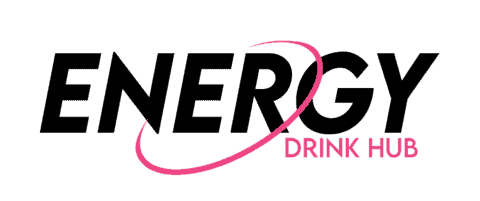If you want to know the answer real quick, Bang is not bad at all if you consume it the way it should be.
A can of 16 fl. oz Bang Energy Drink contains 300 mg caffeine, CoQ10, Super Creatine, and other ingredients blended together to give you the boost that you need for a few hours.
It is one of the most sought-after American energy drink brands, alongside Monster and Redbull. Bang is also known for its zero-calorie and sugar-free energy drinks with a massive amount of caffeine.
Super Creatine, being one of the notable ingredients in Bang, made the drink more popular to fitness enthusiasts all over the world.
But the real question is, is it really bad for you?
Well, I have provided my answer but I would like to do the honor of explaining it further.
So, join me! Let’s find out!
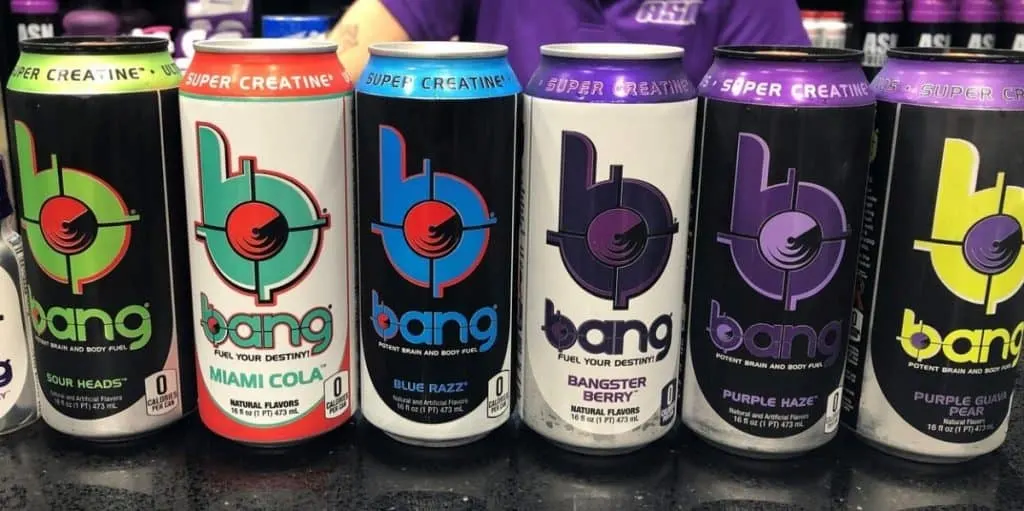
Page Contents
How bad is Bang energy for you?
How bad can Bang Energy be for you relies on how much is consumed. Consuming more than 400 mg of alcohol will not result in an overdose, but may produce a variety of undesirable side effects such as migraine, agitation, or frequent urination.
Is drinking 1 Bang a day bad?
Drinking 1 Bang a day is not bad. Bang is below the recommended 400mg amount by the FDA. However, this does not mean that 1 Bang every single day is good. Moderate amounts of consumption must still be regulated for Bang not to be bad.
What are the ingredients in Bang?
These are the ingredients found in Bang Energy drink:
- Caffeine
- Carbonated Water
- Citric Acid
- Phosphoric Acid
- Sodium Benzoate (preservative)
- Potassium Citrate Monohydrate
- EAAs (Essential Amino Acids)
- Sucralose (Artificial sweetener)
- Natural and Artificial Flavors
- Potassium Phosphate Dibasic
- Vitamin C
- Potassium Sorbate (preservative)
- Acesulfame Potassium (Artificial sweetener)
- Magnesium Chloride
- Super Creatine
- Calcium Chloride
- Calcium Disodium EDTA
- CoQ10 (Coenzyme Q10)
- B-Vitamins
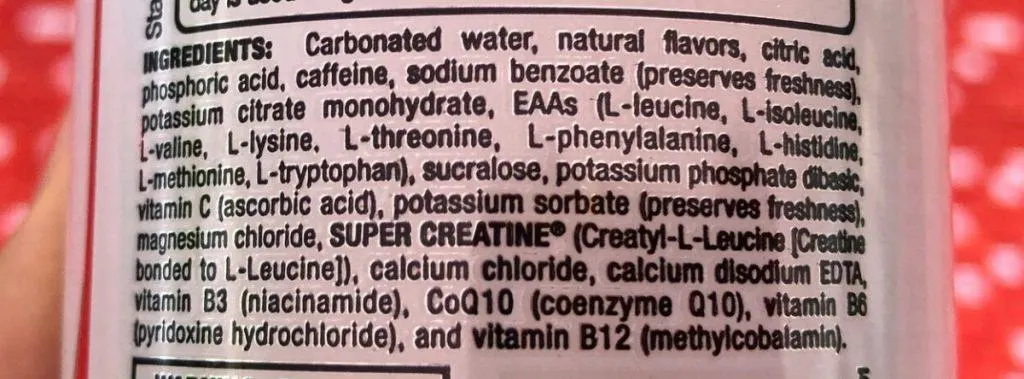
To get a better view, here’s the nutrition facts of Bang Energy:
| Content | Amount |
| Caffeine | 300 mg |
| Sugar | 0 g |
| Calories | 0 g |
| Total Fat | 0 g |
| Cholesterol | 0 mg |
| Sodium | 40 g |
| Total Carbohydrate | 0 g |
| Protein | 0 g |
| Vitamin D | 0 mcg |
| Iron | 0 mg |
| Vitamin C | 27 mg |
| Vitamin B6 | 0.5 mg |
| Magnesium | 5 mg |
| Calcium | 5 mg |
| Potassium | 85 mg |
| Niacin | 5 mg |
| Vitamin B12 | 1.5 mcg |
What are the bad ingredients in Bang?
Sucralose, phosphoric acid, and acesulfame potassium are somewhat considered bad ingredients in Bang.
Phosphoric acid is an additive used in many processed foods as a flavoring and to maintain freshness by preventing the growth of molds and bacteria.
Within the body, phosphoric acid is made from phosphorus which is beneficial for the bones, teeth, kidneys, and muscles. The body needs 700 mg phosphorus to function which you can easily get from the food that you eat.
There’s no mention of the exact amount of phosphoric acid in Bang. So, it’s hard to tell how beneficial it could be.
Bang also contains sucralose and acesulfame potassium, which are often used as artificial sweeteners in energy drinks.
Acesulfame potassium is 200 times sweeter than sugar which is used as a sweetener in food and beverages without adding calories. On the other hand, sucralose is 400 to 700 times than sugar and doesn’t have a bitter after taste like any other sweetener.
These two artificial sweeteners are quite controversial, however, the FDA does consider them safe for general use. So, as long as, you don’t consume drinks with artificial sweeteners regularly, you’ll be perfectly fine.
Rest assured, the amount of sucralose and acesulfame potassium in Bang is safe.
Is 300 mg of caffeine worrisome?
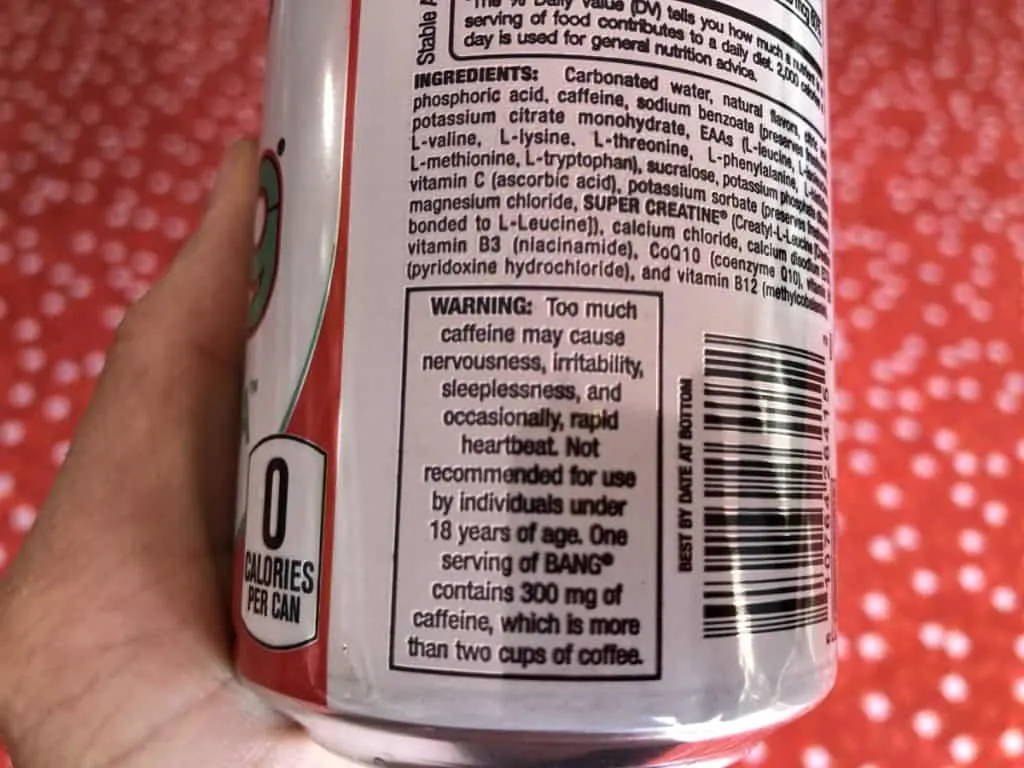
If we look at the recommended caffeine intake per day, 300 mg caffeine is not that worrisome.
But it totally depends on your level of caffeine tolerance, age, sex, and other factors. And maybe 300 mg caffeine is a bit much if you’re a first-time caffeine drinker.
My preference is 150 mg of caffeine or less per serving, but I can easily handle 300 mg as long as it’s well spaced out throughout the course of the day.
Generally speaking, there’s nothing to worry about 300 mg caffeine content in Bang. However, I suggest drinking it slowly and sticking to only one can per day to avoid caffeine discomforts.
Too much caffeine can lead to overdose and these are the mild symptoms that you might experience:
- dizziness
- diarrhea
- increased thirst
- insomnia
- headache
- fever
- irritability
Here are the more extreme symptoms that require immediate attention:
- troubled breathing
- vomiting
- hallucinations
- confusion
- chest pain
- irregular or fast heartbeat
- uncontrollable muscle movements
- convulsions
Is Caffeine-free Bang a safer option?
Caffeine-free Bang could be a safer option if you’re someone with caffeine sensitivity issues.
Plus, you can have it any time of the day without worrying too much about your caffeine intake. It is indeed a convenient choice!
Caffeine-free Bang contains similar ingredients to the regular Bang except that caffeine is substituted with Beta-Alanine.
Beta-Alanine is a non-essential amino acid and the body uses it to produce carnosine to improve exercise performance.
The substitute Beta-alanine presents no side effects when taken in moderation but causes flushing and harmless tingling sensation at high doses.
Beta-Alanine has a standard dosage of 2 to 5 g per day. Too much Beta-Alanine can significantly increase the carnosine in the muscle which can lead to a tingling sensation.
We don’t know for sure how much Beta-Alanine is in Caffeine-free Bang in order to achieve its full benefits. Nevertheless, it is a safe supplement and ingredient in energy drinks.
Is Bang bad for your heart?
In my opinion, any energy drink, including Bang Energy is bad for your heart. The caffeine and energy-boosting properties in energy drinks are linked to heart problems such as abnormal heart rhythm, heart attack, and cardiac arrest.
Added to this, high amounts of caffeine can temporarily increase blood pressure. Caffeine can increase systolic and diastolic blood pressure which can exhaust the muscle in your body and make the condition worst.
This too increases your risk for heart attack, convulsions, and irregular heartbeat. And death if not given quick attention!
So, the best thing to do is to drink Bang in moderation and always consider the recommended intake.
Is Bang bad for your liver?
Energy drinks such as Bang could be bad for your liver if consumed in massive amounts.
This study shows how energy drinks are linked to acute liver injury and hepatitis.
A high amount of caffeine destroys the liver, especially when mixed with alcohol. As the caffeine enters the body, the liver releases enzymes to metabolize the chemical before it enters the bloodstream.
This activity impairs blood sugar uptake in the liver which decreases the glycogens stored in the liver making you feel extremely tired.
Is Bang bad for your brain?
Generally speaking, energy drinks such as Bang affect the brain in some way. And I must say that energy drinks bringing significant damage to the brain is quite exaggerating.
In reasonable amounts, I’d say Bang Energy is not bad for your brain. The caffeine content in Bang can help increase your mental focus and physical performance.
Caffeine helps you focus and keeps you awake and alert while performing tasks or performing workout sessions. This is the reason why people go for energy drinks to obtain a quick boost that could last for hours.
So, a can of Bang can definitely energize you and help you gain a better concentration.
But what about SUPER CREATINE?
The creatine in Bang is referred to as SUPER CREATINE which is bonded with L-leucine, and the combination of the two makes it an effective energy booster.
Super Creatine (Creatine-L-Leucine) is the proud synthetic creation of Bang – the only one of its kind as they claim.
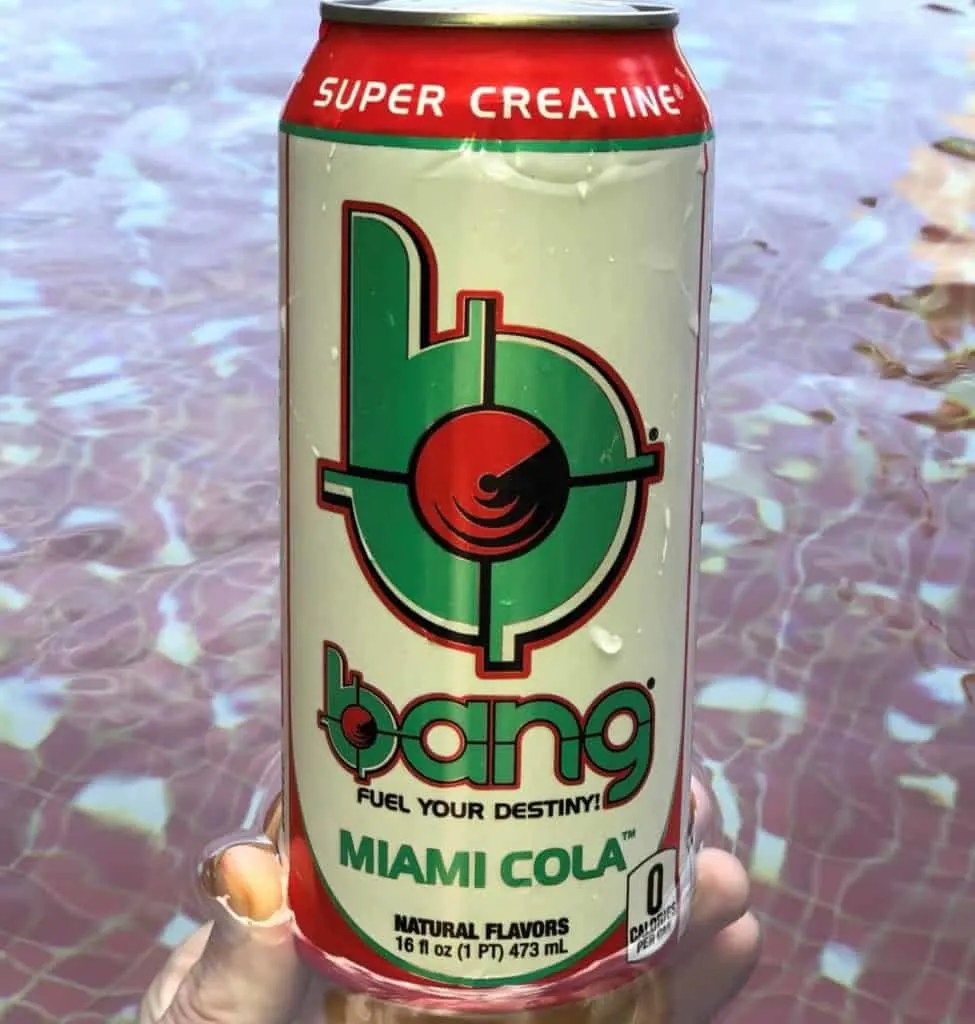
The amount of Super Creatine in Bang is unknown as it’s not indicated in the nutrition label.
I have done a little bit of researching and I found out the Super Creatine is effective, especially when taken before and after exercising.
I found out that the use of creatine and Super Creatine together compensate for the loss of creatine in the body which provides a quick energy boost.
Super Creatine is said to improve cognition because it is absorbed by the brain quickly compared to regular creatine.
The thing is, most of the articles that I came across are focused on the benefits of creatine when combined with Super Creatine.
But keep in mind that this premise isn’t approved by FDA yet. I suggest you do your own research to confirm everything.
How many cans of Bang Energy is safe to drink in a day?
A can of Bang Energy per day is just about right to keep you energized and active.
But I do not recommend finishing the can in one big gulp to avoid any discomfort! It is in your best interest to drink it slowly to avoid caffeine shock, especially when you’re new to caffeinated beverages.
Bang is packed with 300 mg caffeine and other energy-boosting properties designed to help you gain more focus and perform extreme activities for a longer period.
Indeed, it sounds like a perfect energy drink that you can have once in a while!
Do energy drinks do more harm than good?
Moderate consumption of energy drinks can offer temporary benefits like increased alertness and improved focus, but excessive or frequent intake can lead to health risks such as caffeine addiction, elevated heart rate and blood pressure, disrupted sleep, dehydration, and potential adverse effects on mental well-being.
It’s important to consider the potential risks and benefits.
Can 13 year olds drink bangs?
Bang, specifically, states on its label that it is not recommended for individuals under the age of 18.
Excessive caffeine consumption can lead to side effects like nervousness and jitteriness. It is crucial to have open conversations with children about their dietary choices and to be aware of what they are consuming.
Bang Energy Drink Alternatives
Here are my top recommendations:
Key Takeaways
After so much deliberation, I think Bang Energy is not bad for your overall health, if consumed in moderation.
I am not saying that it is a healthy drink considering the amount of caffeine, artificial sweeteners, and other active ingredients that could be harmful to your overall health if taken excessively.
I also think that it isn’t designed to be consumed daily to prevent caffeine dependency.
However, it is an effective energy booster that will allow you to strengthen your focus for quite a while.
Bang is a pre-workout drink designed to increase alertness and delay muscle exhaustion which makes it an ideal drink for someone active.
However, it may not be the right drink for you if you’re one of the unlucky ones who suffer from caffeine sensitivity issues. In your case, I can say that the massive caffeine in Bang is more than capable of giving you nasty headaches!
In summary, I’ll say Bang Energy is not that bad at all, as long as you don’t go past the recommended intake per day.
So, go on. Have a sip of Bang now!
Don’t buy Bang without first checking out my Bang buying guide to ensure you don’t pay too much and get the best deal possible.
Check out this video if you’re interested to know how bad energy drinks are, in general.
